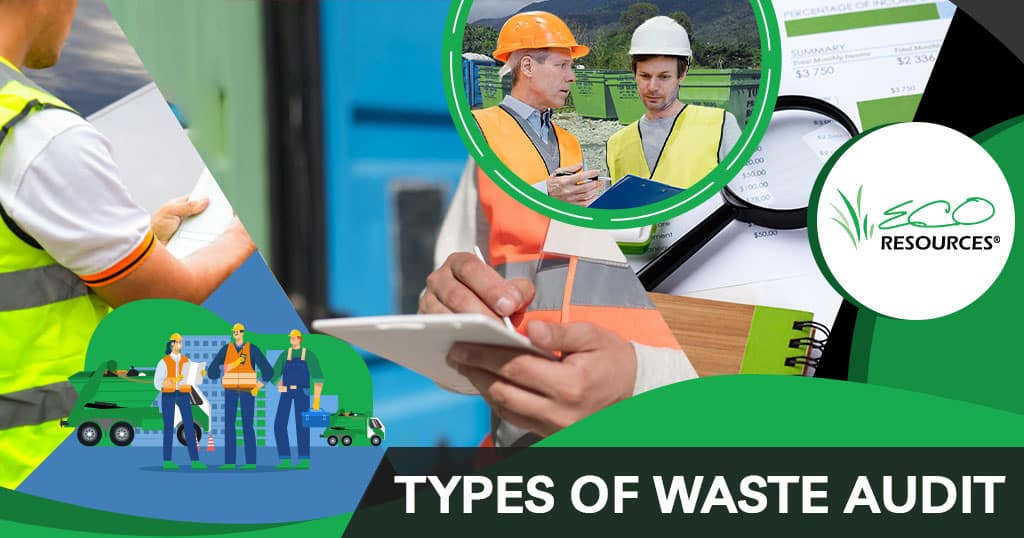

There are several types of waste audits, each tailored to different goals and environments. The choice of audit type depends on the specific needs of the organization or facility.
These audits range from basic to comprehensive and can serve specific purposes, such as verifying billing or assessing the amount of food waste that can be donated.
It is important to select the type that aligns with your goals, although some distinctions between types may be semantic.
This type of audit evaluates the entire waste stream of a facility or organization, including recyclable, compostable, hazardous, and landfill-bound waste.
The goal is to provide a detailed overview of waste generation and management practices. It aims to understand every aspect of waste management to identify areas for improvement and develop comprehensive waste reduction strategies.
This baseline audit process helps a facility identify opportunities to reduce waste. It is simpler and less time-consuming than a General Waste Audit.
The focus of benchmark waste audits is identifying waste streams and implementing initial, often surface-level, changes to enhance waste management. This may include educating employees on proper recycling practices.
The primary aim is to establish a baseline for current waste practices and identify straightforward improvements for waste reduction.
A forensic waste audit involves sorting, separating, weighing, and analyzing all waste generated by your facility. This thorough examination allows for detailed insights into your business’s waste management practices.
This audit is essential for identifying opportunities to optimize resource use and reduce environmental impact. It facilitates highly specific recommendations for improving waste diversion and enhancing sustainability efforts.
A comprehensive waste audit goes beyond the physical waste examination. It also delves into your service cost history and associated expenses. This thorough analysis can uncover costly inefficiencies and identify potential new revenue streams.
Essential for maximizing program effectiveness, this audit measures success and suggests ways to improve operations. It provides a holistic view of your waste management strategy.
This audit focuses on waste generated from a specific area or process within an organization, allowing for targeted waste reduction strategies. For instance, an office might conduct an audit specifically on paper or electronic waste.
This approach is particularly effective in high-waste areas. It helps to pinpoint and address inefficiencies directly, thereby optimizing waste management practices.
This audit targets a specific type of waste, such as plastics, organics, or metals. It focuses on understanding its composition and the potential for diversion or recycling.
By concentrating on one waste stream, this audit facilitates detailed analysis and tailored strategies for effectively managing and reducing waste, contributing to more sustainable practices.
This audit examines the effectiveness and efficiency of existing recycling programs. It evaluates the types of materials being recycled, and contamination levels in recycling bins, and identifies opportunities to improve recycling rates.
By doing so, it helps optimize recycling processes and enhances the overall sustainability of waste management practices.
This audit verifies that waste management practices comply with local, state, or federal regulations. It involves checking disposal methods, ensuring proper signage and labelling, and confirming adherence to waste reduction mandates.
This process not only helps prevent legal issues but also promotes environmentally responsible practices across the organization.
This audit evaluates how close an organization is to achieving zero waste to landfill or incineration. It includes a detailed analysis of waste reduction practices, reuse initiatives and recycling efforts.
By identifying gaps and opportunities, the audit helps develop strategies to minimize waste generation and maximize sustainable practices. Ultimately, it will guide the organization towards environmental sustainability goals.
This audit focuses on identifying the types and quantities of hazardous wastes generated. It is essential for ensuring compliance with regulations and for the safe handling, storage, and disposal of hazardous materials.
Additionally, the audit includes a waste sort inspection, which physically sorts the waste to determine the composition and identify specific disposal challenges, necessary special equipment, and removal strategies.
This audit primarily assesses the management of biohazardous and infectious waste alongside general landfill waste in healthcare settings.
The audit evaluates compliance with health regulations and seeks opportunities to improve waste reduction and sustainability in the healthcare industry. It aims to ensure proper handling, segregation, and disposal practices to minimize risks to health and safety.
Choosing the right type of waste audit can lead to substantial improvements in waste management and contribute significantly to an organization’s environmental sustainability efforts.
Each audit type is designed with specific goals in mind, ensuring that all aspects of waste management are explored and optimized.
Working with a professional waste auditor allows organizations to tailor the audit process to their unique needs, enhancing both efficiency and environmental compliance.

Kristy Sumich is the owner and director of Eco Resources, a prominent waste management and recycling service in Western Australia. With deep industry knowledge and hands-on operational experience, Kristy is dedicated to providing sustainable solutions in waste management.
All rights reserved © Eco Resources. Website by Selling Online Made Simple. Sitemap.